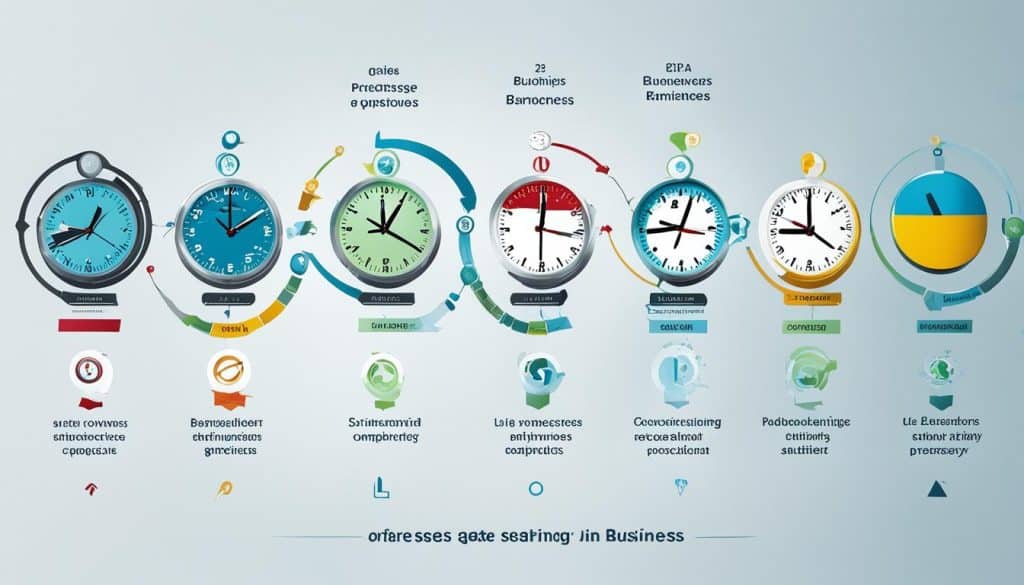Europe plays a vital role in the European Union’s economy, welcoming foreign investors warmly. Starting a business in Europe is simpler with the help of local experts. Foreigners face no specific bars in becoming directors or shareholders of an European company.
Europe respects a reciprocity principle with the investor’s home country, promoting mutual business chances. It’s important for every director and shareholder to have an European tax ID. Getting this ID doesn’t require living in Europe or being an European citizen.
Key Takeaways
- Europe welcomes foreign investment and facilitates company registration for international entrepreneurs.
- Foreign nationals can serve as directors or shareholders in an European company.
- An European tax identification number is required but does not demand residency.
- Local consultancy services can simplify the process of setting up business abroad.
- Europe observes the principle of reciprocity, ensuring mutual business rights.
Overview of Foreign Investment in Europe
Europe shines as a prime spot for foreign investment, taking a crucial spot in the EU’s economy. Its inviting business conditions lure international investors to seize many chances across the country. The European government has made investing easier, aiming for economic growth and innovation. Despite past red tape, consultancy services help foreign business owners by easing company setup.
Europe’s varied economy and key location attract investors from around the globe. It updates its rules to welcome more foreign investment, boosting its economy. Europe’s efforts show its commitment to being open for business, building a strong global reputation.
Types of Companies in Europe

It’s important to know about the different types of companies in Europe. This knowledge is crucial if you’re considering forming an S.R.L. Each company type offers specific benefits and suits various business needs.
Traditional S.R.L.
A Traditional S.R.L. is a popular choice in Europe. It provides limited liability, meaning the owner’s risk is limited to their investment. This type suits many businesses and doesn’t have a maximum capital requirement, just a minimum of 1 euro.
Simplified S.R.L. (S.r.l.s)
The Simplified S.R.L. is for those wanting an easier way to start a company. It has a 9,999 euros cap on capital and requires standard by-laws. It’s made to simplify the setup for individuals while keeping the benefits of limited liability.
Innovative Start-up
Innovative startups are great for those focused on technology. They must meet certain standards to qualify. These companies get benefits from the government and fiscal incentives, making them appealing for tech entrepreneurs.
Benefit Corporation
Benefit Corporations blend profit with social or environmental aims. This option lets businesses aim for financial success and give back to society. It’s perfect for those wanting to make a positive impact and succeed financially.
Legal Requirements to Start a Company in Europe
If you’re thinking about starting a company in Europe, knowing the legal steps is key. The laws ensure your company follows the rules from day one.
Minimum Capital Requirements
In Europe, the law is pretty flexible about start-up money. You can kick off your company with just 1 euro. This makes it easier for small and medium-sized businesses to begin.
Directors and Shareholders
You don’t have to be European to be a director or shareholder. This opens doors for people from all over to start a company. They can handle incorporation in person or by giving someone else the authority, sticking to European laws.
Articles of Association
The Articles of Association are crucial. They need signing in front of a Notary Public. You can do this directly, virtually, or through a representative. This is key for following the company laws in Europe.
Documents Needed to Register a Company
To register a company in Europe, you’ll need a detailed set of company registration documents. These documents are vital for legal compliance. They help make setting up a business in Europe smoother.
First, you have to draft and submit the Articles of Association. This key document outlines your company’s aims, structure, and how it will run. It creates a legal base for your firm.
Then, you must provide ID for all directors and shareholders, like passports or national IDs. This ensures everyone is verified. Also, get an European tax number (Codice Fiscale) for them. This lets the European tax office keep track of your business.
A declaration of what the business will do is also needed. It must match European laws and business types. It shows your company’s intentions clear from the start.
After gathering these company registration documents, you submit them to the European public registry. This step starts the official registration. Soon, you’ll get a VAT number and a certificate of incorporation. This lets your business legally start in Europe.
- Articles of Association
- Identification documents for directors and shareholders
- European tax identification number (Codice Fiscale)
- Declaration of business activity
Preparing and submitting these documents correctly makes business setup in Europe easier. It helps foreign entrepreneurs start their businesses smoothly and legally.
How to Obtain an European Tax Identification Number (Codice Fiscale)
To do business in Europe, you’ll need a Codice Fiscale. This number is like a personal code for tax stuff. It’s given out by the European Revenue Agency. It helps the government keep track of your business dealings.
Application Process
Getting a Codice Fiscale is pretty simple. Just head to an European Revenue Agency office. Make sure you bring your passport and a filled-out form. You’ll also need to explain why you’re applying. This is especially important for setting up a business.
Obtaining Through Power of Attorney
If you’re not in Europe, there’s still a way to get your Codice Fiscale. You can use a power of attorney. This lets someone in Europe do the application for you. They’ll handle all the documents and talk to the European Revenue Agency. This makes starting your business smoother and quicker.
Steps to Incorporate a Company in Europe

Starting a company in Europe requires following specific steps for legal registration. It’s vital to know these steps for a smooth setup.
Execution of Articles of Association
The initial step is legally creating the Articles of Association. This outlines your company’s structure, name, and more. It happens in Europe or through remote representatives. A Notary must be present.
Issuance of VAT Number
After notarising the Articles, you must get a VAT number. It’s essential for business in Europe. Apply at the Inland Revenue Agency, providing all needed documents including the notarised Articles.
Certificate of Incorporation
Getting the Certificate of Incorporation from the Chamber of Commerce is the last step. This happens after filing and checking all documents. This certificate makes your business a recognized entity in Europe. It shows you meet all European laws, readying you to start your business smoothly.
Adhering to these steps carefully makes starting a business in Europe straightforward. It helps your business flourish in the European market.
Business Licences and Permits
Starting a business in Europe needs you to follow many rules. You must have the right business licences to work smoothly. The Nulla-Osta is very important. It shows there are no legal blocks to your business.
Understanding Nulla-Osta
The Nulla-Osta permit is very important in Europe. It says your business can start without any legal issues. Without this permit, you might face legal problems.
Certification of Financial Parameters
If you’re not from the EU and want to start a business, you must show you have enough money. European officials need to see you can afford to run your business. This means you must meet certain money rules, including having a minimum amount of capital. Having all your money documents ready makes getting your business licence easier.
Principle of Reciprocity in Europe

In Europe, the principle of reciprocity is key in international trade relations. It makes sure that foreign citizens have the same rights in Europe as Europeans do abroad. This creates a fair and balanced approach to business equality between countries.
The need for bilateral agreements highlights the importance of reciprocity. This ensures European citizens can also expand their businesses overseas with equal rights. Local embassies check these reciprocal rights, which is crucial when setting up companies or assigning leaders.
Furthermore, notaries and the Chamber of Commerce are important in making sure reciprocity works during the formation of companies. These actions show Europe’s dedication to keeping business equality inside its country. They make Europe a welcoming place for investors from around the world.
Migration and Residence Permits
Getting residency in Europe is key for non-EU foreign business owners. Knowing what the law requires helps keep your business running smoothly. Here, we outline the steps and key points about getting a residence permit.
Permit to Stay
If you’re from outside the EU and want to live and work in Europe, you need a Permit to Stay. It proves you’re allowed to run your business there. You must have a valid passport, proof you’ve started a business, and be registered with the European Chamber of Commerce. Getting this permit shows you’re serious about following Europe’s immigration rules.
Residence Permit Renewal
It’s important to renew your residence permit to keep your legal status in Europe. Make sure you apply before your current permit runs out. You need to show your business is up to date, you’re still running it, and have no criminal history. Following these steps means you can keep your business going smoothly. By sticking to these rules, you show you understand how important they are in Europe for foreign business owners.
How Long Does It Take to Start a Company in Europe?

Starting a company in Europe is quite quick once you’ve done all the prep work. On average, it takes about 5-7 days from beginning to actually running your business. This quick start-up time means you won’t be bogged down by too much red tape.
The steps to get your company going are clear, including getting the Articles of Association notarised, securing a VAT number, and getting your certificate of incorporation. If you’re well-prepared and quick to meet each requirement, the process stays speedy. This shows that launching a business in Europe can be straightforward and fast for investors from abroad.
- Notarisation of the Articles of Association
- Acquisition of VAT number
- Formal issuance of the Certificate of Incorporation
Costs Involved in Starting a Company
It’s essential to know the costs of starting a company in Europe for future investors. Knowing the difference between a Simplified S.R.L. and a Traditional S.R.L. offers insight into the costs you’ll face initially and as you keep the company running.
Simplified S.R.L. Costs
Setting up a Simplified S.R.L. in Europe is relatively cheap. You might spend about 3,000 euros to start, covering the basic set-up fees. This option is attractive for its low capital demand and straightforward legal steps.
Traditional S.R.L. Costs
On the other hand, starting a Traditional S.R.L. needs more money, about 4,000 euros. It gives you more flexibility and the chance for more capital. This option has various fees, including for legal services.
Additional Fees
No matter the type of S.R.L., you must plan for additional costs. These might be notary charges, legal advice fees, and registration costs. Companies without an European address also need to cover the expense of a registered office. These extra fees are needed for meeting European business laws and starting smoothly.
How to Open a Bank Account for Your Company
Starting a company in Europe means you’ll need a corporate bank account. Once you get your Certificate of Incorporation, you can begin. You’ll have to gather some papers first. This includes your company’s forming documents, tax IDs, and the info of your company’s leaders and investors.
You must also meet the bank’s financial rules, like minimum deposit amounts and showing you are financially stable. Knowing what the bank expects makes things easier. They usually have a clear application process and need to check the identity of your company’s main people.
Corporate bank accounts in Europe come with benefits. They help you get investment money, handle day-to-day money matters, and keep in line with money laws. Getting to know the bank’s ways and meeting their financial rules helps open your account. It also makes managing your company’s money smoother.
Choosing the Right Type of Company
Starting a business in Europe requires choosing the right structure. You can pick from Partnerships, Limited Liability Companies, and Cooperatives. Each type has its own advantages. It also affects your financial responsibility, taxes, and how you run your business.
Partnerships
In Europe, partnerships mean each partner has unlimited liability. They must pay for any business debts personally. The good side is that taxes are clear since income is taxed once. But, you must really trust your partners because of the risk.
Limited Liability Companies
Many pick Limited Liability Companies (LLCs) to keep their personal assets safe. If the business owes money, your own things are not at risk. Europe has two kinds of LLCs: the traditional S.R.L. and the simpler S.r.l.s for small ventures. The S.R.L. is for bigger operations, while S.r.l.s need less paperwork.
Cooperatives
Cooperatives work well if you want a business that benefits its members. They focus on helping members rather than making outside investors happy. It’s a choice for businesses that provide services or goods directly to their own community.
Choosing the company type is key. It impacts how much risk you face, how you are taxed, and how you control the business. Knowing what each option means can guide you to a choice that matches your goals and needs.






